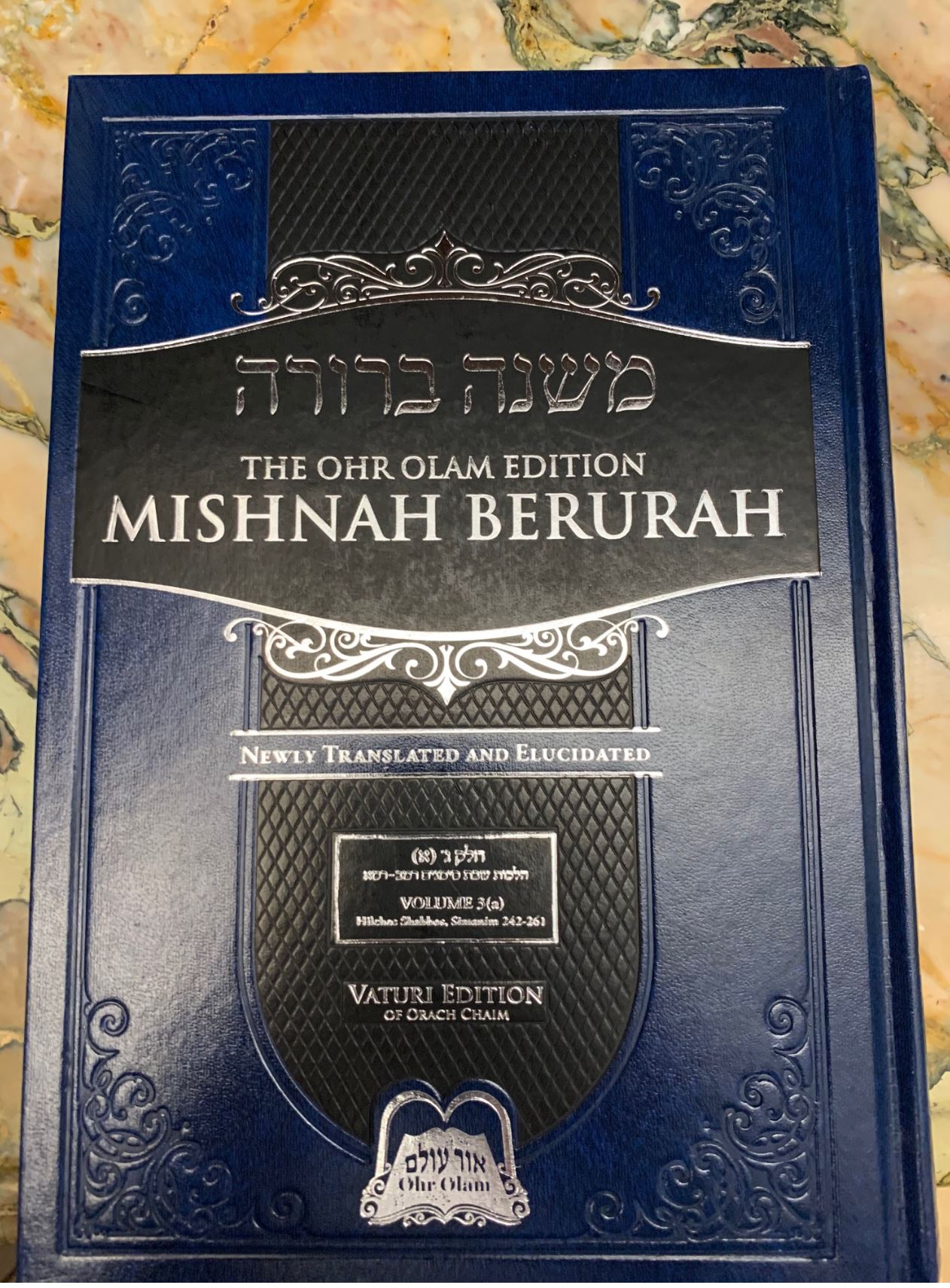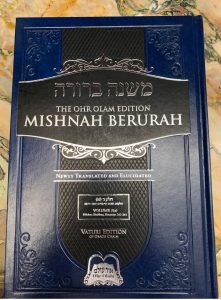This week we begin with a public service announcement and a shameless plug. Back in the year 2448, the Yiddin received two tablets containing the Aseres Hadibrois, the Ten Commandments. Life was forever changed. Comedians joke that the original plan called for but one; the Yiddin however upon hearing it was free, asked for, and got two. Shoin, an oldie but germane to what follows. In the year 5780, we’re backing with another freebie; this one with one condition.
Several months back the Oisvorfer was introduced to a newly minted Mishneh Birura, a very up to date, Hebrew and English, user-friendly, and chock full of elucidation new edition written to help those interested in learning halocho limyseh. What is the Mishneh Birurah? Literally translated, the words mean “clarified teaching”, ober in reality; it is a work of halocho (Jewish laws). The Mishneh Berurah is traditionally printed in 6 volumes consisting of 697 chapters alongside selected other commentaries. The work provides simple and contemporary explanatory remarks and citations to daily aspects of halocho. The Mishneh Berurah is an explanation of laws common to daily ways of life such as prayer, talls, tefillin, Shabbis, Yom Tov observances, and much more.
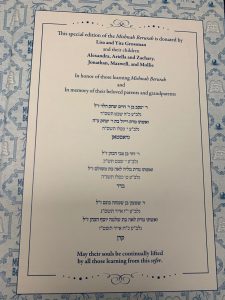 How this all came about is for another day, ober the bottom line is this. While eating potato kugil and minutes after hearing and seeing a volume, the Oisvorfer and eishes chayil agreed to sponsor one volume in honor of parents and grandparents on both sides who have passed, all of blessed memory. Ohr Olam and the Grossman family have generously offered to provide those who are trying to make an effort to learn halocho, with a free Hardcover Chelek Gimmel (Hilchos Shabbos) Volume 1 of its new English Mishneh Berurah. Those interested in accepting this offer, please pick one up from Congregation Baisment in Lawrence New York. If you live elsewhere, call or text Shya Hersh @ 516-666-7646 for pick-up information. Tell him the heylige Oisvorfer sent you. Here is the inscription found on the inside cover. The Oisvorfer urges his readers to get one. Shoin, let’s learn parshas Toldois.
How this all came about is for another day, ober the bottom line is this. While eating potato kugil and minutes after hearing and seeing a volume, the Oisvorfer and eishes chayil agreed to sponsor one volume in honor of parents and grandparents on both sides who have passed, all of blessed memory. Ohr Olam and the Grossman family have generously offered to provide those who are trying to make an effort to learn halocho, with a free Hardcover Chelek Gimmel (Hilchos Shabbos) Volume 1 of its new English Mishneh Berurah. Those interested in accepting this offer, please pick one up from Congregation Baisment in Lawrence New York. If you live elsewhere, call or text Shya Hersh @ 516-666-7646 for pick-up information. Tell him the heylige Oisvorfer sent you. Here is the inscription found on the inside cover. The Oisvorfer urges his readers to get one. Shoin, let’s learn parshas Toldois.
FIRST SPERM: YAAKOV AND REUVAIN
Shoin: we’re midway into sefer Bereishis -Bereishis has twelve parshas and Toldois is number six- and it’s time for a shtikel mid-book review. Let us then begin with a recap. In case you skipped shul these past six weeks, say it’s not so please, here’s but part of the excitement you missed. In the beginning, Kayin killed Hevel, the snake snookered and efsher also seduced Chava into eating the forbidden, following the mabul (flood) which wiped out mankind, save Noiach and his immediate family, his own grandson Chom raped, sodomized -or both- his grandfather, say it’s not so. A parsha later, Loit’s two amazing daughters raped their father; Avrohom diddled and impregnated –with his wife’s consent- his housemaid Hogor. That union gave us –seemingly forever- Yishmoale. And if that weren’t enough action for a pew parshas, Soro was taken not once, but twice, not by one king but by two, to their respective palaces for a meet and greet, if you chap with the royal staff, if you chap, only to be saved by the RBSO’s machinations. Yitzchok and Rivka, in this week’s parsha had twins with each parent favoring one child over the other. The result: Eisav plotted to kill his own brother which on the low-life meter puts him rungs below Kayin who killed but did not do so with intent. Given his lack of premeditation, the RBSO eventually forgave Kayin. The bottom line: Many of the Toirah characters presented since parshas Bereishis, seem to have been flawed, aren’t we all? Ober, that did not stop the RBSO from selecting each for Toirah inclusion, for leadership, for greatness, and a few, Avrohom, Yitzchok, Soro and Rivka also claiming the first spots on the short list of matriarchy and patriarchy. Mamish and taka uplifting. Is being human and somewhat, or even more flawed, a prerequisite? Certainly bad news for the ultra-righteous, and givaldig for the rest of us.
Ober wait: there are more parshas in sefer Bereishis and a number of other storylines about the Yaakov Ovenu family, the heylige shvotim (tribes) and more. They involve conspiracy to murder, kidnapping, cover-ups, inter family sexual relations and much more; stay tuned, the heylige Toirah never disappoints. In the coming weeks we will be reading how the wheels came off the bus in the Yaakov household; it’s a story with a murder plot, conspiracy, kidnapping, cover up, and much more. All it’s missing is some connection to Ukraine and impeachment. Ober before we get to Yoisef and his brothers, we need to take a look at this week’s parsha of Toldois where we find a previously barren Rivka –according to most, 20 years- now pregnant. Ober her pregnancy is not smooth. Her belly is rumbling, she decides to investigate, to seek counsel.
And she went where to learn about these rumblings? For reasons which at first seem illogical to you, only because you don’t fully chap how the RBSO runs His world, instead of visiting with her obstetrician, or a trip to the emergency room, she travels to a yeshiva. Nu, mistama she knew that all answers can be found in the heylige Gemora. Isn’t that what our rebbes taught us? It is! She, like other Toirah celebs who preceded her, ends up in the Yeshiva of Shaim and Ever to discuss her very personal matters; her pregnancy. Was it a real yeshiva? What were they studding? Did either Shaim or Ever ever attend or graduate medical school? Take on-line courses? Go to school in Mexico or the Dominican Republic? Ver veyst? Though we have covered this world famous yeshiva in the past, none of these questions have ever been answered, and the bottom line is azoy: the medrish tells us that as a result of her pregnancy pains, she wound up in the yeshiva; worse things can happen. It certainly helped those trying to avoid the Vietnam War.
Ober does everyone agree that she went all the way to the yeshiva to find out what was causing the disturbance in her womb? Taka it’s emes that the Yeshiva of Shaim and Ever was used by our sages whenever they found a gaping lacuna and sought to fill it by teaching us that missing years, places or events can all be answered with the Yeshiva, ober other sages suggest a different approach. Let’s chazer what took place. Says the heylige Toirah: “Veteylech Lidroish es Hashem”, she went to ask or seek counsel from the RBSO. Ober what’s really the pshat here? What does the word lidroish really mean? Where did she do this “lidroish” thing? The words tell us she went, ober where to?
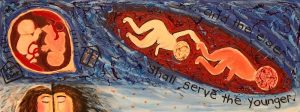 Says the Radak: she went to seek counsel from Avrohom. There is no shame in not seeking out Shaim and Ever’s yeshiva. Says the Rashbam: she went to a prophet at the time without getting involved in exactly who that prophet was, he does not name names. Ober says the Ramban so gishmak, azoy: the translation of the word “lidroish” is not to be understood as seeking information about the future. Instead, it means to pray; Rivka went to daven and ask the RBSO for help. Rivka was troubled by the pregnancy and turned to the RBSO in prayer. Let’s recall that she did the same while barren. Davening for her was natural. The very next pusik (verse) where we read “And G-d said to her…” lends credence to this pshat. According to the Ramban there is no one else in the story. There is no Shaim, Ever, Avrohom, or any other person or prophet. The RBSO responded to her prayer directly! Shoin and there taka is a lesson for all: when in need, go direct. There is no need to seek out middlemen and influencers who can get you in to see the mikubil of the month, or anyone else; the RBSO does listen to direct prayers. He doesn’t always answer in the affirmative but He does listen. Rivka davened, the RBSO answered. Ober does the RBSO talk to women? Oy vey, what will people say in shul? Says the heylige Gemora (Yerushalmi: Soita): except for Soro, the RBSO never spoke directly to a woman! Ober according to the Ramban it is the RBSO Himself who responds to Rivka. It is very rare to find a direct and immediate response to any tefila, but Rivka received one. Let’s also recall that Rivka had prophetic powers (ruach hakoidesh). She did? Says the heylige Toirah (Bereishis 27:41) that Eisav secretly planned to kill his brother; asks the medrish how Rivka learned of the plot. Says the medrish (Bereishis Rabbah 67:9): It is because the Matriarchs were prophets, and Rivka knew of Eisav’s plan through her prophetic powers. Let us also recall that she holds the number two slot in the matriarchy.
Says the Radak: she went to seek counsel from Avrohom. There is no shame in not seeking out Shaim and Ever’s yeshiva. Says the Rashbam: she went to a prophet at the time without getting involved in exactly who that prophet was, he does not name names. Ober says the Ramban so gishmak, azoy: the translation of the word “lidroish” is not to be understood as seeking information about the future. Instead, it means to pray; Rivka went to daven and ask the RBSO for help. Rivka was troubled by the pregnancy and turned to the RBSO in prayer. Let’s recall that she did the same while barren. Davening for her was natural. The very next pusik (verse) where we read “And G-d said to her…” lends credence to this pshat. According to the Ramban there is no one else in the story. There is no Shaim, Ever, Avrohom, or any other person or prophet. The RBSO responded to her prayer directly! Shoin and there taka is a lesson for all: when in need, go direct. There is no need to seek out middlemen and influencers who can get you in to see the mikubil of the month, or anyone else; the RBSO does listen to direct prayers. He doesn’t always answer in the affirmative but He does listen. Rivka davened, the RBSO answered. Ober does the RBSO talk to women? Oy vey, what will people say in shul? Says the heylige Gemora (Yerushalmi: Soita): except for Soro, the RBSO never spoke directly to a woman! Ober according to the Ramban it is the RBSO Himself who responds to Rivka. It is very rare to find a direct and immediate response to any tefila, but Rivka received one. Let’s also recall that Rivka had prophetic powers (ruach hakoidesh). She did? Says the heylige Toirah (Bereishis 27:41) that Eisav secretly planned to kill his brother; asks the medrish how Rivka learned of the plot. Says the medrish (Bereishis Rabbah 67:9): It is because the Matriarchs were prophets, and Rivka knew of Eisav’s plan through her prophetic powers. Let us also recall that she holds the number two slot in the matriarchy.
We have previously covered the saga of Rivka and how she- like her mother-in- law Soro was taken to the king’s palace for a shtikel rendezvous which happily did not materialize. Nu, the RBSO again came to the rescue and Rivka was reunited with her husband Yitzchok. No hard feelings, if you chap. In years past we also covered the fact that Rivka –again like Soro- was nebech barren and how after many years and davening to the RBSO, she became pregnant and delivered twins. We shall skip that as well. This week, as mentioned just above, we meet the twins Yaakov and Eisav, with Eisav having been born seconds or minutes before his youger brother. And with those few moments, he laid claim to the birthright which Yaakov had a hankering for. As an aside, the heylige Toirah tells is bifeyrush (in the text itself) that Eisav laid out a plot to eventually kill his brother. Medrish tells us that he also plotted and laid out many women, including those already attached to a husband. Oy vey! The bottom line: many a medrish paint him with an ugly brush. We will close this week’s review with another view on Eisav but not quite yet. Another bottom line: Yaakov wanted the birthright; he felt it was meant to be his. His mom, acting as an unindicted co-conspirator developed an elaborate plan to get it for him. The plot, each twist and turn of how Yaakov and his amazing mother Rivka plotted to outwit Eisav is covered in 28 pisukim of this week’s parsha. As they say, mother knows best.
Ober, if Eisav was taka born first, what right did Yaakov, known for the trait of ‘emes’ (truth) have to connive Eisav into selling? Was our foremother Rivka, she a holy woman imbued with ruach hakoidesh, acting properly? As you can imagine, many an exegete, when reading the parsha, had the same question. What’s taka pshat? One theory is that Eisav may not have been born first. He what? Ober doesn’t the heylige Toirah specifically tell us farkert? It does! Says the heylige Toirah (Bereishis 25: 25-26) azoy:
| 25. And the first one emerged ruddy; he was completely like a coat of hair, and they named him Eisav. | כהוַיֵּצֵ֤א הָֽרִאשׁוֹן֙ אַדְמוֹנִ֔י כֻּלּ֖וֹ כְּאַדֶּ֣רֶת שֵׂעָ֑ר וַיִּקְרְא֥וּ שְׁמ֖וֹ עֵשָֽׂו: | |
26. And afterwards, his brother emerged, and his hand was grasping Eisav’s heel, and he named him Yaakov. Now Yitzchok was sixty years old when she gave birth to them. |
כווְאַֽחֲרֵי־כֵ֞ן יָצָ֣א אָחִ֗יו וְיָד֤וֹ אֹחֶ֨זֶת֙ בַּֽעֲקֵ֣ב עֵשָׂ֔ו וַיִּקְרָ֥א שְׁמ֖וֹ יַֽעֲקֹ֑ב וְיִצְחָ֛ק בֶּן־שִׁשִּׁ֥ים שָׁנָ֖ה בְּלֶ֥דֶת אֹתָֽם: |
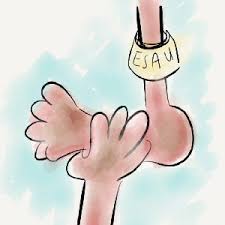 Was he or wasn’t he born first? Let’s find out. Though the heylige Toirah makes it abundantly clear that Eisav taka emerged first with Yaakov clinging onto Eisav’s heel, is it efsher shayich (possible) that Yaakov was really born first and therefore had all the rights to snooker his brother into selling him the bichoira (birthright)? And to examine this possibility, to make Yaakov seem like the rightful owner, we turn to the medrish which tells us a givaldige chidish (breakthrough), azoy.
Was he or wasn’t he born first? Let’s find out. Though the heylige Toirah makes it abundantly clear that Eisav taka emerged first with Yaakov clinging onto Eisav’s heel, is it efsher shayich (possible) that Yaakov was really born first and therefore had all the rights to snooker his brother into selling him the bichoira (birthright)? And to examine this possibility, to make Yaakov seem like the rightful owner, we turn to the medrish which tells us a givaldige chidish (breakthrough), azoy.
Says Rashi (Bereishis 25:26), this is compared the idea to a very narrow cylinder. Two stones were put in one after the other. The one put in first, will be the second one to come out. The one put in second will come out first. Eisav who was conceived second therefore was born first. Yaakov, who was born second, was actually conceived first. The medrish: He, Eisav, was born first as he was the product of the last drop of Yitzchok’s seminal ejaculation. You hear this raboyseyee? Ober what does his father’s seminal ejaculation have to do with birth order? We owe this insight to Rebbe Yossi’s response to the lady’s question in Pessikta Zutrata quoted in the above mentioned medrish. He explained to her that if someone puts two pearls inside a tube sealed at one end, and he wants to access the first one he inserted, he first has to remove the ones he inserted at a later stage. In our story also, in order for the world to be able to enjoy the benefits Yaakov contributed to the Jewish nation and people, -he is the father of the Jewish people- and thereby to mankind, Eisav had to be born first, as he had blocked Yaakov’s way. In other words: Yaakov was conceived from Yitzchok’s first drop of semen so that he was innermost in Rivka’s womb. And the bottom line of this medrish: since Yaakov was seemingly conceived first from Yitzhok’s first drop of semen, the birthright was really his. Therefore, the plot concocted by Rivka and executed to perfection by Yaakov, was but a means of getting back, of rightfully restoring (using some trickery), what was really his. Grada O.J. Simpson tried getting back things he said were his, ober it got him a stiff sentence. Veyter.
They heylige Toirah tells us Yaakov emerged with is hand holding onto the heel of his brother Eisav. Says another medrish that pshat in the words: וידו אוחזת, “with his hand grabbing” is azoy: the younger baby’s hand is portrayed as holding on to the older twin’s heel already while still inside Rivka’s womb. Says the Novee in Hoshayah (Hosea 12,4) בבטן עקב את אחיו, “in the womb he tried to overtake his brother.” What’s pshat he tried already in the womb to take over Eisav’s position and emerge first? The word עקב is understood to mean: “heel, hoof.” Yaakov is presumed to have tried to prevent Eisav from becoming the firstborn. He wanted out first as he had developed from his father’s first drop of semen as quoted by Rabbi Yossi in the medrish aforementioned. This would enable Yaakov to claim the status of being the legal firstborn. His failure to prevent Eisav from emerging from Rivka’s womb first, prompted him years later to acquire that status through buying the birthright from his brother.
 Says another medrish, Eisav maintained that he was the firstborn. On the other hand, Yaakov knew that he himself was actually the firstborn. Since the Patriarchs were in the “mind” of the RBSO when He created the world, they were “created” first. In other words: it’s mind over matter. Yaakov also knew that he was conceived first, from Yitzchok’s first drop of semen and since Yaakov was the first to be conceived, he was second to be born. The bottom line: whether or not Yaakov was born from Yitzchok’s first drop of semen and Eisav from the last, ver veyst, ober we must tip our respective yarmulke’s to our chachomim (sages) who many generations before DNA testing was available, already figured out that which drop of semen was used to impregnate and conceive both the boys. Gishmak.
Says another medrish, Eisav maintained that he was the firstborn. On the other hand, Yaakov knew that he himself was actually the firstborn. Since the Patriarchs were in the “mind” of the RBSO when He created the world, they were “created” first. In other words: it’s mind over matter. Yaakov also knew that he was conceived first, from Yitzchok’s first drop of semen and since Yaakov was the first to be conceived, he was second to be born. The bottom line: whether or not Yaakov was born from Yitzchok’s first drop of semen and Eisav from the last, ver veyst, ober we must tip our respective yarmulke’s to our chachomim (sages) who many generations before DNA testing was available, already figured out that which drop of semen was used to impregnate and conceive both the boys. Gishmak.
And guess what? We’re not done with sperm identification just yet. Later in Sefer Bereishis –much later- with Yaakov lying on his deathbed he will remind Reuvain that he too was conceived with his father’s first drops of semen. Says Rashi (Bereishis 49:3) that Reuvain was conceived with the first drop of semen that Yaakov emitted. How this fits with earlier pisukim which tell us that the RBSO only opened Leah’s womb after He saw that Leah was the hated wife, which was only after Yaakov discovered that he had married Leah when he was played by his cunning shver (father-in-law) and then demanded and did in fact marry Rochel a week later, ver veyst? In other words: as the heylige Toirah reads, Yaakov had already bedded Leah at least once on their wedding night and how he did not emit sperm that night, ver veyst? Says Rashi (ibid) quoting the heylige Gemora (Yivomis 76a): “וראשית אוני: היא טפה ראשונה שלו, שלא ראה קרי מימיו:”
That is his first drop of semen, for he had never experienced a nocturnal emission. Seemingly, Rashi’s statement does not count the drops used to impregnate Leah with Reuvain, but stresses Yaakov’s piety, instead. Avada many of you have questions and so did our sages. Reuvain was not only Yaakov’s first-born (and thus also first-conceived) child, but the medrish states, in rather hyperbolic fashion, that the latter never so much as had an involuntary seminal discharge until his wedding night (which, ironically, was spent with a woman he thought was someone else). This phrase thus stresses sexual purity and control as an important component of virtue and holiness, with semen –in case you didn’t already know- as an obvious focus of power, vigor, potency, etc. Shoin, in case you still have questions on Yaakov’s first emissions and any others, those and efsher enlightening and entertaining answers, for another day, ober the bottom line of this medrish is that Yaakov, on his deathbed mamish, reminded Reuvain that he was the product of his first emission. Did Yaakov hold back while bedding Leah? Ver veyst? Efsher you recall that just last week we mentioned that Yaakov was somehow and very miraculously able to withhold spilling any seed for over 80 years. And shame on you chevra that already began in high school and still continue! Shoin!
Ober if Yaakov was taka the rightful first-born, why did the RBSO arrange things so that Eisav came out first? Avada the medrish asks this very question and answers azoy: In order that he together with any afterbirth, i.e. something dispensable and at the same time despicable content of the womb, would be discarded with the emergence of Eisav. Rebbe Abahu illustrated this by means of a parable in Pessikta Zutrata: when entering a bathtub or public bath, the servant always precedes his master in order to clear away any offensive residue left behind by the previous user. In other words: Eisav was born first but he was a shtik drek and therefore, though Yaakov conned him, it was all right and his right to do so to get back his rightful birthright. Besides, if his own mama (mother) planned and staged the event, was Yaakov a big practitioner of kibud Av, Vo’eym (honoring one’s mother and father) not going to listen? The bottom line: one must always listen to his mother. Ober was Eisav taka a shtik drek, a ver bad guy?
And we close with this: though most midroshim paint Eisav as very bad, let’s also recall that until he was fifteen years old, he was good. Rashi tells us that until their bar mitzvah, the bother Yaakov and Eisav were indistinguishable. What happened at fifteen during their teen years? His grandfather Avrohom with whom he was very close passed away. Eisav was devastated and traumatized; he could not function and seemingly never recovered from the loss. There were mitigating circumstances. And the lesson: efsher we need to look at all the facts and relevant factors before judging others.
A gittin choidesh Kislev, happy thanksgiving, and ah gittin Shabbis koidesh!
The Heylige Oisvorfer Ruv
Yitz Grossman
